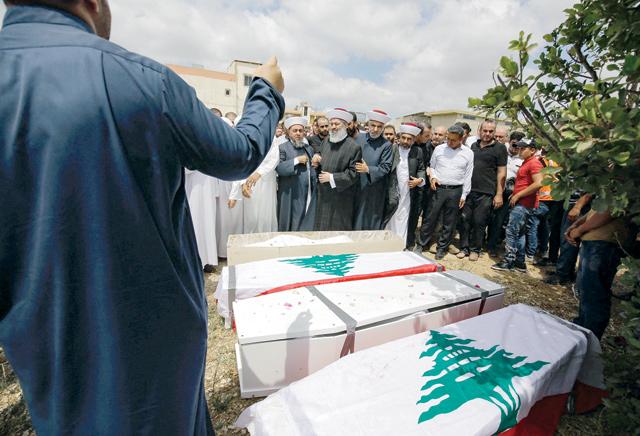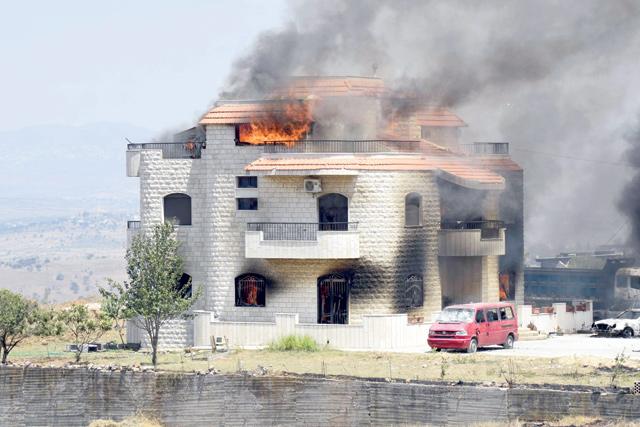You are here
Lebanon fuel tank explosion kills 28, overwhelms hospitals
By AFP - Aug 15,2021 - Last updated at Aug 15,2021

Vehicles burn outside the reported home of the lot owner, where the exploded fuel tank was placed, in the village of Tlel in Lebanon's northern region of Akkar on Sunday (AFP photo)
BEIRUT — A fuel tank blast in Lebanon early on Sunday killed 28 people and injured nearly 80, authorities and medics said, burning a crowd clamouring for petrol in the crisis-hit country.
The tragedy in the remote north overwhelmed medical facilities and heaped new misery on a nation already beset by an economic crisis and severe fuel shortages that have crippled hospitals and caused long power cuts.
It revived bitter memories of an enormous explosion at Beirut port last August that killed more than 200 people and destroyed swathes of the capital.
An adviser to the health ministry said the death toll from the blast in Al Tleil village in the Akkar region had climbed to 28. The Lebanese Red Cross said 79 others were injured.
The military said a fuel tank that “had been confiscated by the army to distribute to citizens” exploded just before 2:00am (23:00 GMT). Soldiers were among the victims.
The army began raiding petrol stations Saturday to curb hoarding by suppliers following a central bank decision to scrap fuel subsidies.
The official National News Agency (NNA) said the blast followed scuffles between “residents that gathered around the container to fill up gasoline” overnight.
Hospitals in Akkar, one of Lebanon’s poorest regions near the border with Syria, and in the northern port city of Tripoli said they had to turn away many injured because they were ill-equipped to treat severe burns.
“The corpses are so charred that we can’t identify them,” said Yassine Metlej, an employee at an Akkar hospital.
“Some have lost their faces, others their arms,” Metlej told AFP.
‘Victims of a careless state’
A security source told AFP DNA testing would start “soon” to identify victims.
Health Minister Hamad Hassan said he was in contact with countries including Turkey, Kuwait and Jordan to evacuate serious cases abroad.
Ismail Al Sheikh, 23, burned on his arms and legs, was driven by his sister Marwa to Beirut’s Geitawi hospital, some 80 kilometres away.
“We were informed that the army was distributing gasoline... so people flocked to fill it in plastic containers... straight from the tank,” Marwa told AFP.
Some said a lighter sparked the blast, she said; other witnesses claimed shots were fired.
The explosion was widely seen as a direct consequence of official negligence that had pushed the country deeper into free fall.
“The dead are victims of a careless state,” Marwa told AFP.
Sawsan Abdullah burst into tears at Geitawi Hospital when a doctor told her that her son, a soldier, was in a critical condition.
He had only been looking for petrol so he could go to his job in the army, she told AFP.
“He’s my only son!” Abdullah yelled, falling to the floor.
Lebanon, hit by a financial crisis the World Bank says is probably one of the planet’s worst since the 1850s, has been grappling with soaring poverty, a plummeting currency and dire fuel shortages.
The central bank this week said it could not afford to fund fuel subsidies because of dwindling foreign reserves, and accused importers of hoarding fuel to sell at higher prices on the black market or in Syria.
Fuel shortages have left many with just two hours of electricity a day.
The American University of Beirut Medical Centre, Lebanon’s top private hospital, said it would close by Monday morning if it did not secure diesel to power generators, risking hundreds of lives.
Search for missing
President Michel Aoun ordered a probe into the blast and chaired an emergency meeting of the defence council, his office said.
The meeting agreed to provide hospitals with the diesel they desperately need to power generators, said a statement.
The council also called on the government to task security forces with monitoring the storage and distribution of fuel to prevent further incidents.
Angry Akkar residents raided and torched a vacant house believed to belong to the owner of the plot where Sunday’s explosion took place, the NNA reported.
The blast comes less than two weeks after Lebanon marked the first anniversary of the Beirut Port explosion.
Despite the economic crisis, political wrangling has delayed the formation of a new government after the last Cabinet resigned in the wake of that blast.
Vital international aid pledges remain contingent on a new government being formed to spearhead reforms, and on talks restarting with the International Monetary Fund.
Russia called for a “thorough investigation” into the blast and Jordan urged a “comprehensive plan” that would usher Lebanon into safety.
Related Articles
BEIRUT — Hospitals in the Akkar region of north Lebanon where a fuel tank explosion killed at least 28 people this week struggled to operate
AL-DAOUSEH, Lebanon — Families laid to rest Wednesday victims of a fuel tank blast that killed at least 28 people in northern Lebanon amid a
BEIRUT — Lebanon reeled Monday from a deadly explosion that burned alive people desperate to fill plastic containers with fuel in a country



















